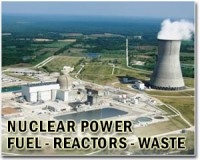 |
Paris (AFP) March 29, 2011 Radioactive contamination of the sea from Fukushima is likely to be only a local problem, but could lead to an exclusion zone if there is a major release of long-term pollutants, scientists say. So far, the biggest contaminant identified by Japanese officials has been radioactive iodine 131. Samples of water taken close to the plant have been as high as 1,850 times the legal limit of iodine, but levels have fallen back, Japanese officials said on Tuesday. Radioactive iodine can enter the marine food chain, especially through seaweed, which absorbs this element readily. "There is the potential, when you're talking about certain types of seafood, that you can have reconcentration," said Ed Lyman of the Union of Concerned Scientists (UCS), a respected US NGO that focuses on nuclear safety. "So, even dilute levels of contamination can be enhanced in certain marine life, you know, just like mercury concentrates in large fish like tuna. Also, plants like seaweed are known to concentrate certain isotopes, and so are certain types of shellfish." Radioactive elements are hazardous in food because when ingested their radiation can damage DNA in cells, with the potential to cause cancer. However, the contamination from iodine 131 is short-lived because the element has a half life -- the pace at which it loses half of its radioactivity -- of only eight days. "This means that after a few months, it will be harmless, basically," said Simon Boxall, a lecturer at Britain's National Oceanography Centre at the University of Southampton, southern England, who praised early measures to stop fishing around the plant after the March 11 disaster. "What worries me more is if caesium and plutonium get into the system," he said, referring to two radioactive heavy metals whose half-lives are around 30 years and potentially thousands of years respectively. "That's more concerning, because that can build up in the sediments" of the sea bed at Fukushima, said Boxall. At high levels, this could lead to the imposition of an exclusion zone of catches of fish and seafood, a measure that could last "years and years," he said. "It's hard to know (how long) until they start taking measurements and determine how extensive the pollution is. "You would basically not fish in an exclusion zone, period. And beyond the exclusion zone there would be an additional zone where you would come from time to time and see if there's any radioactivity." Fukushima's plant operator, the Tokyo Electric Power Co. (TEPCO), reported on Saturday that levels of caesium were almost 80 times the legal maximum. On Monday it also said that plutonium, at very low and harmless levels, had been found at five locations in soil at the plant. Given the scale of the Pacific -- the world's vastest body of water -- radioactivity in the sea at Fukushima will be flushed out beyond the local area by tides and currents and dilute to very low levels, Boxall said. "It will get into the (ocean) food chain but only in that vicinity," he said. "Should people in Hawaii and California be concerned? The answer is no." The Pacific, thanks to its size, is one of the cleanest seas in the world for radioactive contamination, according to the Woods Hole Oceanographic Institution in Massachusetts. In 1990, radiation in the surface North Pacific was four becquerels of caesium 137 per cubic metre, while in the South Pacific it was 1.6 Bq/m3, it says. Most of it came from atmospheric nuclear tests before these blasts were stopped. The most polluted seas were the Baltic, hit by fallout from the 1986 Chernobyl disaster, with 125 Bq/m3; the Irish Sea, with 55 Bq/m3 due to radioactive releases from Britain's Sellafield plant; and the Black Sea, also contaminated by Chernobyl, with 52 Bq/m3. By comparison, the US Environmental Protection Agency (EPA) sets a maximum of 3,700 Bq/m3 of caesium in drinking water.
Share This Article With Planet Earth
Related Links Nuclear Power News - Nuclear Science, Nuclear Technology Powering The World in the 21st Century at Energy-Daily.com
 Finns' support for nuclear slips due to Japan crisis: poll
Finns' support for nuclear slips due to Japan crisis: pollHelsinki (AFP) March 29, 2011 Nearly half of people in Finland, where a new generation nuclear reactor is being built, say the crisis in Japan has shaken their trust in nuclear power, a poll released Tuesday showed. According to the Gallup poll published in the Helsingin Sanomat daily, the public's overall support for building more reactors fell five percentage points to 48 percent, when compared to a similar poll conduc ... read more |
|
| The content herein, unless otherwise known to be public domain, are Copyright 1995-2010 - SpaceDaily. AFP and UPI Wire Stories are copyright Agence France-Presse and United Press International. ESA Portal Reports are copyright European Space Agency. All NASA sourced material is public domain. Additional copyrights may apply in whole or part to other bona fide parties. Advertising does not imply endorsement,agreement or approval of any opinions, statements or information provided by SpaceDaily on any Web page published or hosted by SpaceDaily. Privacy Statement |